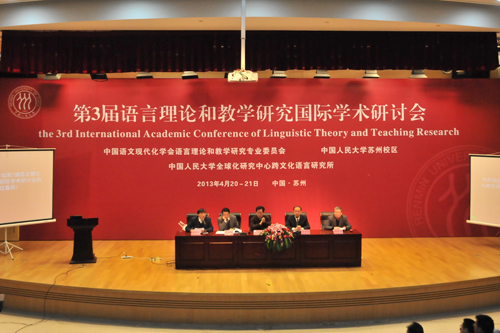‘Pragmatism’ prescribed for modern language studies

3rd International Conference of Linguistic Theory and Teaching Research
masterdocfr
“As an academic discipline, modern language studies needs to be more pragmatic; in so doing it can become more meaningful,” said Ma Qingzhu, president of the Society for the Modernization of the Chinese Language. Ma was addressing an international crowd of nearly one hundred experts and scholars who gathered in Suzhou on April 20th for the 3rd International Conference of Linguistic Theory and Teaching Research. Themed “linguistic theoretical research and teaching Chinese as a foreign language”, the conference covered a range of issues, varying from theoretical explanations for new linguistic phenomena in contemporary Chinese to research for textbooks on theories in linguistics and second language acquisition and research on learning strategies.
Undertaking linguistic research requires national confidence, attendees affirmed at the conference. Still, the general consensus was that in addition to staying on top of domestic research dynamics, Chinese scholars need to be even more attuned to international demand.
For its soft power to be both appealing and effective, a nation has to adopt appropriate language strategies that are geared toward making its soft power more disseminable, Chen Chao explained. Chen, who is the director of the foreign affairs office at Renmin University of China’s Suzhou Campus, said that language strategy can be broken down into two domains: policy-making and language planning. Language policy is directed at the contemporary, ongoing usage and management of a language, its status and authority, and the ideology (ies) embedded within it and the cultural products that use it. Language planning refers to influencing others’ linguistic behaviors consciously—dividing languages according to their structures or functions in order to alter the geographic domain in which they are practiced over time or otherwise affect language use habits.
“Demand, right now for us, is the guiding principle. The demand for studying Chinese as a foreign language certainly provides a firm direction for our current research,” Ma Qingzhu maintained.
Shen Yang, a professor from the department of Chinese language and literature at Peking University, observed that as it evolves, a language will have new elements and usages. When teaching Chinese as a foreign language, and writing the corresponding textbooks, Shen advocated striking a fine balance, on the one hand avoiding instruction that neglects emerging adaptations of Chinese as if by impulse, but on the other not teaching them at the expense of grammar and language rules generally. To establish norms in language instruction in a way that is simultaneously scientific and dynamic, we need to eliminate exceptions in teaching but be permissive when it comes to common practices and conventions—ultimately we need to be willing to entertain a host of ideas, he concluded.
Hu Xiaoyan, a professor from the College of Liberal Arts at Northeast Normal University, elaborated on the explicit and tacit meaning of Chinese idioms. The explicit meaning is the literal meaning that emerges after combing the constituent words and characters. These reflect the linguistic and cultural phenomena of the time period from which the idiom originated, Hu explained. He elucidated that the tacit meaning of an idiom is the deeper import underlying the cultural phenomena it describes or references; this reflects the cultural spirit of the society and time from which the idiom originated, embodied in the value orientation, thinking patterns, social psychology, ethical concepts and aesthetic values which compose that society and were operative at that time.
The conference was organized by the Committee of Linguistic Theory and Teaching Research at the Society for the Modernization of the Chinese Language and hosted by Renmin University of China’s Suzhou Campus and Center for the Study of Globalization at RUC’s Suzhou Campus.
Zheng Fei and Wu Nan are reporters from Chinese Social Sciences Today.
The Chinese version appeared in Chinese Social Sciences Today, No. 443, Apr 24, 2013.
Translated by Jiang Hong
